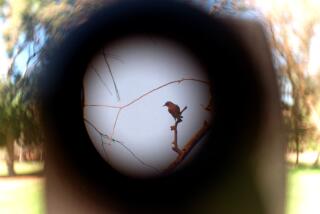Trading His Soul for Their Flesh : THE WAY OF THE HUNTER The Art and Spirit of Modern Hunting <i> by Thomas McIntyre (E. P. Dutton: $18.95; 180 pp.) </i>
- Share via
Thomas McIntyre, the hunting editor of Sports Afield magazine, has combined practical advice, philosophical musings, taxonomic persuasions, literary allusions and the kind of storytelling hunters reserve for times around the campfire to produce this volume.
Hunters will no doubt embrace the book and lovingly recall with the author childhood squirrel hunts that led to bird shooting at sunrise with the grown-ups, those old hunters wise in the ways of the field, the ones who pat a kid on the back, say, “Good shot, son,” and make the world stop in its tracks for a moment. Hunters will also enjoy learning the history of the shotgun and how the sport of bird shooting has grown and changed over the centuries. The arguments for and against big guns for big game will help long, huntless, winter nights slip by.
Non-hunters are not likely to be convinced. It may not be possible to persuade non-hunters of the legitimacy of shooting out of a tree a leopard of feral beauty, no matter how deadly its capacities. Even dropping a deer in its tracks with a shot through the heart, then packing the meat into a household freezer, may hold little water for those non-hunters who prefer their meat wrapped in plastic and sold by the pound.
McIntyre doesn’t much help break down the barriers between the two camps. Too often, his writing gets in the way. Gray’s Sporting Journal calls Thomas McIntyre “the naturalist hunter’s new poet laureate.” After slogging through some of the most convoluted sentences ever set in type, the reader may think of that accolade as an indictment on writing from the world of blood sport.
For example, to highlight the separation of the hunter and non-hunter worlds, McIntyre writes in his typical way: “A certain class of intractable moralists, who tend to perceive existence in terms far more streamlined than the woefully complex and ambiguous actuality of it would really seem to tolerate, admonish us that the chase is at best ignorant carnival, at worst a heinous crime, and in any case a dark urge long ago to have been put behind us. Yet there persists in so many of us an insatiable hunger to set off, in spite of it all--the lack of experience, the lack of familiarity with the land, the abundance of reproach--in pursuit of animals, to locate them on their native grounds and on their own terms, to ‘take’ them (capturing their flesh as they capture our souls--as fair a trade-off as there ever was), and to partake once more of a feast as old as every hill and every hunter, whether naked and carrying a spear or down-jacketed and packing an .06 with a four-power scope, who ever crept over a ridge crest to look for wildlife--and the ‘wild life’--on the other side.”
The author’s taste for dash-enclosed phrases, parenthetical asides and commas scattered through his text like thousands of little kisses suggests a writer none too convinced by his own arguments, a writer who lards it on in florid excess, just to be sure. A certain measure of weight is given to this argument by the author himself. When he is writing about the actual hunt, his line is simple and clear and so evocative that the reader can’t help but feel the stare of the leopard, can’t help but feel his own heart freeze in the moment just before the trigger is squeezed. But these delicious little moments of storytelling are mere asides in what has to be taken as a grander philosophical scheme.
I have a friend who is an avid duck hunter, and his daughter has grown up seeing the results of his considerable shooting skill come through the kitchen door each fall. She was 10 when she asked her dad to take her along, and when he agreed she raced through the neighborhood telling all her friends. Never had a little girl been more excited.
She knew the flavor of wild duck. She knew the kick and sound of a shotgun. But she hadn’t put the act of shooting together with the act of killing a living thing, the results of which were the birds she helped her father pluck in the back yard.
She loved the long drive, the night in the motel, the rising before dawn, the whispered greetings of other hunters in the blind, the hot cocoa poured from her father’s thermos. And then the first ducks flew over.
Her father rose up, brought the shotgun to his shoulder, took sight and knocked a duck out of the air with one shot. He watched it drop to the water, then commanded the retriever to swim after it. My friend turned to his daughter, only to find a little girl staring back in absolute disbelief that he could be so cruel. “What,” she asked, “did that duck ever do to you?” The hunt was over. She wanted to go home.
It may not be possible to answer that very basic question about hunting. Thomas McIntyre has certainly tried to seek an answer in a highly literate effort. What McIntyre needed was an editor willing to take him to task and straighten the kinks out of convoluted prose.
More to Read
Sign up for our Book Club newsletter
Get the latest news, events and more from the Los Angeles Times Book Club, and help us get L.A. reading and talking.
You may occasionally receive promotional content from the Los Angeles Times.






